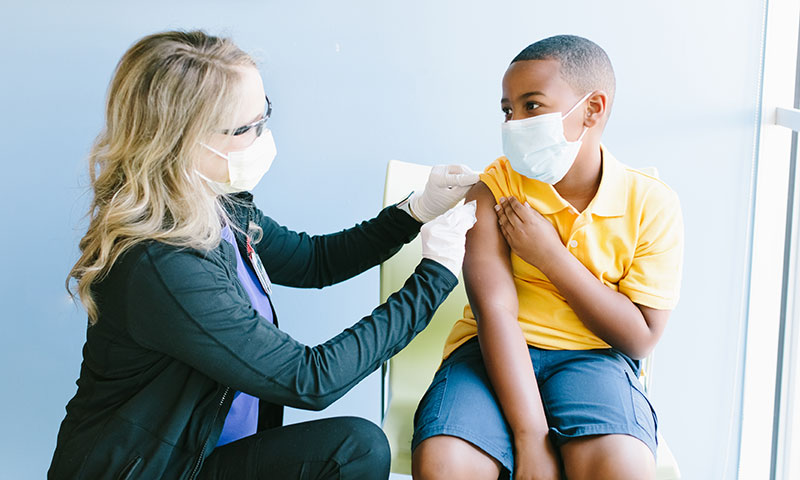On October 29, 2021, the U.S. Food and Drug Administration (FDA) authorized use of the COVID‑19 vaccine in children ages 5-11. On June 17, 2022, the COVID‑19 vaccine was also authorized for children under age 5.
Below, Jeffrey Kahn, M.D., Director of Infectious Disease at Children's Health℠ and Professor at UT Southwestern, answers parents' frequently asked questions about the COVID‑19 vaccine for children ages 5-11.
Is the COVID‑19 vaccine safe for children?
COVID‑19 vaccines have been given safely to hundreds of millions of people in the U.S. These vaccines have been closely studied and monitored, and data shows they are safe and highly effective at preventing illness. Still, parents may wonder if the COVID‑19 vaccine is safe for younger, growing children.
The COVID‑19 vaccine for children had to meet high standards for safety and effectiveness to be authorized by the FDA. In clinical trials, the COVID‑19 vaccine was found to be safe, well-tolerated and produce a strong antibody response in children. Experts will continue to monitor the vaccine and its safety as more children get vaccinated.
Does emergency use authorization mean the COVID‑19 vaccine is not thoroughly tested?
During a public health emergency like a pandemic, the FDA can make medical supplies and treatments available in a timely manner under an emergency use authorization (EUA). A vaccine must be carefully tested and meet rigorous criteria to be authorized for emergency use. The FDA closely reviewed safety and efficacy data on the COVID‑19 vaccine before authorizing its use in children.
How effective is the COVID‑19 vaccine in children?
The COVID‑19 vaccines are highly effective at preventing serious illness from COVID‑19. In clinical trials for children ages 5-11, the Pfizer COVID‑19 vaccine was 90.7% effective at preventing symptomatic COVID‑19. For those who did get COVID‑19 after vaccination, the vaccine appeared to reduce the severity of illness.
Among 12- to 18-year-olds, the Pfizer vaccine has been 93% effective at preventing hospitalizations according to the CDC. Unvaccinated adolescents are 10x more likely to be hospitalized with COVID‑19 than their vaccinated peers.
Why should I vaccinate my child for COVID‑19 if their risk of serious illness is low?
Children are at lower risk of serious illness from COVID‑19 compared to adults. However, the arrival of the highly contagious variants showed that children can and do get sick from COVID‑19. During late summer and early fall of 2021 when the Delta variant emerged, there was a dramatic rise in COVID‑19 in children. Then, when the Omicron variant spread, hospitalizations of children for COVID‑19 spiked.
- As of June 2022, over 13.5 million children in the U.S. have tested positive for COVID‑19.
- During the Omicron surge, COVID‑19 hospitalizations in children ages 5-11 were twice as high for children who were not vaccinated as opposed to children who were vaccinated.
- Children with even mild COVID‑19 symptoms may be at risk for rare long-term side effects, including multisystem inflammatory syndrome in children (MIS-C). As of mid-June 2022, more than 8,500 children have been diagnosed with MIS-C after COVID‑19.
"Children can and do experience illness from COVID‑19. We've seen a spike in COVID‑19 hospitalizations in children. This includes children who were otherwise healthy and were unvaccinated, as well as younger children, who were not yet eligible to be vaccinated," says Dr. Kahn. "The best way to keep your child safe is to get them vaccinated if they are eligible."
In addition to keeping your child safe, Dr. Kahn explains that vaccinating children is key to protecting others in your family, as well as the community.
"We know that kids, both symptomatic and asymptomatic, can transmit the virus and are bringing the virus home," says Dr. Kahn. "By immunizing children, we can get this pandemic under control. We all want to return to normal life and with this highly effective vaccine, we have the chance to do that."
Is the COVID‑19 vaccine for children the same vaccine as for teens and adults?
The COVID‑19 vaccine for children is the same vaccine as for teens and adults, but it is given in a smaller dose. This smaller dose is due to the development of a child's immune system, not based on a child's size or weight.
Will my child experience any side effects from the COVID‑19 vaccine?
Your child may experience some side effects after getting the COVID‑19 vaccine. Side effects are typically mild and are normal signs that the vaccine is building protection against COVID‑19. Possible COVID‑19 vaccine side effects in children include:
- Pain, redness or swelling at the injection site
- Tiredness
- Headache
- Muscle pain
- Chills
- Fever
- Nausea
COVID‑19 vaccine side effects may be more common after the second dose than the first dose. These side effects should go away within a few days. Some children have no vaccine side effects.
How can I treat my child’s COVID‑19 vaccine side effects?
If your child feels pain or discomfort where they got their COVID‑19 vaccine, try placing a cool, wet washcloth on the area. Encourage them to exercise or move the area.
Ask your child's health care provider about additional ways to relieve any pain or discomfort, such as pain or fever-reducing medications following vaccination. Make sure you always give your child the appropriate dose of any medication. Offer plenty of fluids to encourage hydration.
It is not recommended that you give your child any pain-relieving medications before they get their COVID‑19 vaccine to prevent side effects.
Should I call my child's doctor about any COVID‑19 vaccine side effects?
Mild side effects, including fever, are normal signs that the vaccine is working to build protection against COVID‑19. Most of the time, these side effects will go away in a few days. Contact your child's health care provider if:
- The redness or pain at the injection site gets worse after 24 hours
- Their side effects are worrying you or do not go away after a few days
Seek immediate medical attention if you think your child is having a severe allergic reaction to the COVID‑19 vaccine. Signs of severe allergic reaction include rapid heartbeat, swelling of the throat, rash or hives. This reaction is extremely rare.
Could there be any long-term effects of the COVID‑19 vaccine for children?
There is no evidence of any long-term effects of the COVID‑19 vaccine in children. The COVID‑19 vaccines have been safely given to millions of people so far. Side effects of any vaccine are most likely to occur within 6 weeks after vaccination. The FDA required the COVID‑19 vaccine be studied for at least 8 weeks after the final dose to ensure its safety.
"There is always risk of rare side effects from any medication or vaccine," says Dr. Kahn. "I understand that parents may have concerns over what's unknown. But what we do know is that the risks associated with COVID‑19 illness are far greater than any risk of the vaccine."
One rare side effect that parents may have heard about is the chance of heart inflammation, or myocarditis. Dr. Kahn explains that people are more likely to experience myocarditis after COVID‑19 illness than they are after vaccination. In the rare cases of vaccine-related myocarditis, symptoms have been mild and resolve quickly.
Other parents may have heard misinformation that the COVID‑19 vaccine affects fertility. There is no evidence to support this myth. Experts will continue to monitor the COVID‑19 vaccine to ensure it is safe and effective.
Should my child get the COVID‑19 vaccine if they have a medical condition?
Yes, the COVID‑19 vaccine is safe and recommended for children with chronic or underlying medical conditions.
Children with certain medical conditions – including obesity, diabetes, sickle cell disease, cancer, cystic fibrosis, kidney disease and more – may be more likely to get severely ill if they get COVID‑19. Therefore, it's even more important to make sure these children get vaccinated.
Should my child get vaccinated if they've already had COVID‑19?
Your child should get the COVID‑19 vaccine even if they already had COVID‑19. Studies have shown that the vaccines can trigger a COVID‑19 immune response stronger than the one naturally present in people who had COVID‑19.
Will my child need a COVID‑19 booster or a yearly shot?
Booster shots are recommended by the CDC for everyone who is eligible, including kids ages 5 and older. Learn more about COVID‑19 vaccine booster shots and if your child is eligible.
Can my child get the COVID‑19 vaccine at the same time as other vaccines?
Your child can get the COVID‑19 vaccine at the same time as other routine vaccinations. Our immune response and side effects are generally the same when a vaccine is given alone or with other vaccines. Talk with your child's health care provider if you have any questions about your child's vaccine schedule.
Where can my child get a COVID‑19 vaccine?
Children may be able to get a COVID‑19 vaccine at their pediatrician's office, or at a variety of community clinics and pharmacies.
Contact your child’s health care provider to ask about vaccine availability or see a list of community vaccination sites. You will not need to pay for your child’s COVID‑19 vaccine. It is given at no cost to the recipient.
Where can I get more information about the COVID‑19 vaccine for children?
Information about COVID‑19 and the COVID‑19 vaccines may be updated over time. It is important to turn to trusted medical experts to understand what's true and what's not.
If you have questions about the COVID‑19 vaccine and your child's health, ask your child's health care provider for more information. You can also turn to trusted resources, such as the CDC website.
"It's normal to feel apprehensive, but I encourage parents to consider the risks and benefits. The data is there," Dr. Kahn says. "The COVID‑19 vaccines are among the best vaccines that have ever been produced and can prevent life-threatening illness. It's a great gift we have, and we have to use it."
Watch our vaccine town hall to learn more
For more information about the COVID‑19 vaccine, watch a video of our virtual town hall.
More COVID‑19 resources
Children's Health is committed to remaining a trusted source of health information and care for you and your family during this time. See more resources to keep your family healthy at the Children's Health COVID‑19 hub.

Thank you!
You are now subscribed to the Children's Health Family Newsletter.
Children's Health will not sell, share or rent your information to third parties. Please read our privacy policy.
